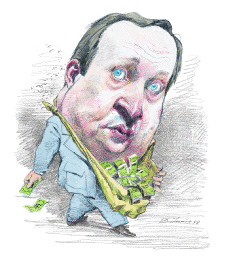 |
| This David Levine caricature accompanied a New Yorker profile, published in the issue of July 6, 1998, when Summers led the U.S. effort to fortify faltering Asian economies. (See also the Time cover for February 15, 1999, shown on page 34.) |
| David Levine |
For a decade, Lawrence H. Summers has been dogged by a memo, bearing his name, purporting to advocate exporting polluting industries to poor nations ("underpopulated countries in Africa are vastly underpolluted") and dumping toxic wastes there ("the economic logic...is impeccable"). The memo, dated December 12, 1991, during his service as vice president and chief economist of the World Bank, found its way to the press, and has since circulated widely on the Internet. It was the subject of a question at his March 11 news conference at Loeb House, and of student protests then and the next day. Summers responded to the reporter, "I think the best that can be said is to quote La Guardia and say, "When I make a mistake, it's a whopper.'"
There is more to the story. In a 1998 New Yorker profile, writer John Cassidy reported that "the memo was composed by a young economist who worked for him, and that Summers, after a cursory review of it, co-signed it to stimulate internal debate." Of the furor the memo provoked, Summers told Cassidy, "I learned to read a lot more carefully what I sign." He went on to say that "The basic sentiment...is obviously all wrong," and that although there are "real issues about trade-offs between growth and the environment," in this case, "the way those thoughts were expressed wasn't constructive in any sense." Cassidy interviewed Lant Pritchett, the memo's author, who said, "I strongly recommended that he say I had written it and he had just signed it. Larry said no, that wasn't his style. Whatever he signed he would take responsibility for. He took the flak...."
Pritchett joined Harvard's Kennedy School of Government as a lecturer in public policy in the fall of 2000. In a recent interview, he explained that at Summers's request, he reviewed a draft of the bank's annual Global Economic Prospects report, focusing on trade liberalization. In a seven-page memo to Summers, he critiqued several aspects of the argument, including a claim that free trade would necessarily produce environmental benefits in developing nations. He questioned the data supporting that claim, and in criticism wrote as an "ironic aside" suggestions that if (in conventional economic terms) dumping pollutants on poor countries would be "welfare-enhancing" for the world as a whole, the bank ought to endorse that policy. Summers scanned the memo, absorbing its general criticisms (Pritchett doubts he read the environmental section, but thinks Summers devoted sufficient time to the memo), and then had Pritchett reformat its heading for forwarding to other bank staff over Summers's signature.
Thereafter, Pritchett says, someone with access to the memo doctored it, combining the heading and the sentences on pollution and toxic waste, shorn of their context and the intended irony. In this one-page form, appearing to be a policy proposal, the memo found its way to the Economist. "In my mind it was a deliberate fraud and forgery to discredit Larry and the World Bank," Pritchett says. He interprets the incident not as an indication of bureaucratic insensitivity, but as "bureaucrat stands up for junior colleague for 10 years for something he never did."
As a coda, Pritchett notes, at a staff picnic in the summer of 1992, he found himself paired in a tennis doubles round-robin with Summers. Trailing 3-4, and with Pritchett serving, the twosome fell behind love-30. Summers left the net and told his partner, "You know that environment memo? That was your first mistake. If they break your serve, that will be your second." Pritchett won the game. "Competitive?" he says of playing tennis with Summers. "You don't know the half of it!"





